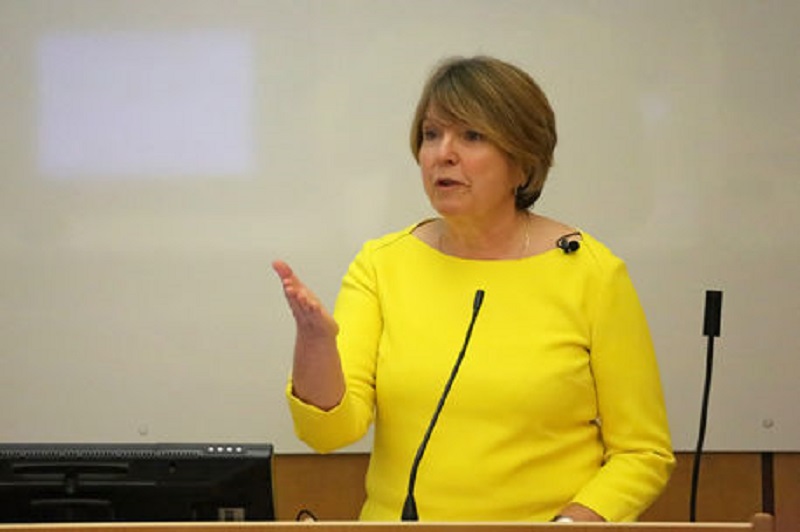
Urgent action is needed to press for a reduction in carbon emissions ahead of next year's UN climate summit in Paris, Dame Barbara Stocking told a packed audience at the first annual Gates Cambridge Lecture tonight.
Urgent action is needed to press for a reduction in carbon emissions ahead of next year's UN climate summit in Paris, Dame Barbara Stocking told a packed audience at the first annual Gates Cambridge Lecture tonight.
In a talk entitled Is there Enough for All of Us? Global Growth, Climate Change and Food Security, Dame Barbara, president of Murray Edwards College and former Chief Executive of Oxfam GB, said she wanted to challenge people's way of thinking about the issues, to address what individuals could do about food security and inspire people to action on tackling climate change. "I want you to go away with real fire in your bellies. As global leaders, Gates Scholars will have a very big task on their hands in addressing climate change," she said.
She painted a picture of how the world was using up all its resources, had already breached environmental boundaries in certain areas and was close to breaching them in others. Beyond these boundaries it would be impossible to sustain the planet, she said. It was the developed world which was using most of the resources and the poor were suffering the results. While the developed world talked about climate change as a future threat, the developing world was already experiencing it.
"No one knows the answers to how we can stop these boundaries being breached, but do not doubt that these questions have to be answered," she stated. One suggestion was to look at how we measure growth. GDP was based on economics, said Dame Barbara, and omitted other things, like caring roles. "Does GDP describe how we want to be?" she asked. "Does an increase in GDP bring us more happiness?" Research seemed to suggest that above an income of $25,000 per person people did not get any happier. "It is not clear wealth brings happiness," argued Dame Barbara, adding that growing inequality seemed to make everyone less happy.
She then addressed food security. She said 840m people were undernourished and yet the world had enough food to feed everyone currently. By 2050 the world would require 70% more food to feed an increasing and wealthier population. There were actions people could take, such as tackling the huge amount of food waste. In the developed world this was mainly due to excess food not being eaten after purchase while in the developing world it was due to a lack of the means to keep food fresh. It was not impossible to tackle these issues, said Dame Barbara. Another issue was population growth which was best addressed by providing more education for girls and greater access to contraception. Food production also needed to be increased with greater support being given to women farmers in particular, who made up 70% of the poor farmers in Africa. In addition, the power chain in food supply had to be tackled, with campaigners already having had some success in lobbying against companies which have been making land grabs in developing countries to prepare for a future of food scarcity.
Dame Barbara then turned to climate change which she said was driving up food prices, particularly as a result of extreme weather incidents. A rise of 2 degrees in the global temperature could be dealt with, but scientists were now talking about rises of three or four degrees which would create problems for everyone. She said: "Climate change is happening. The most common phrase I heard from farmers in developing countries in my last five years at Oxfam was that the seasons have changed and we do not know what is happening or why."
There were things that could be done, such as helping people to help themselves by providing them with cash not food so they could buy the food they needed locally or promoting sustainable agriculture. The biggest issue, however, was to lower carbon emissions. It was vital to press for action at the Paris summit. "We have to find a way for everyone in every country to get the message to their government that they expect their leaders to deal with this problem," said Dame Barbara. "It requires the support of people like you – the leaders of tomorrow – to take action," she said, addressing the Gates Cambridge Scholars. "Things will get so difficult that eventually decisions will have to be taken. It is not what happens, but when it hapens that matters. The longer things go on as they are, the more poor people will suffer. Governments need to be asked to please get on and do something as some people are already in the midst of climate change now. It is not something that is coming in the future. I hope you will take up that call."












